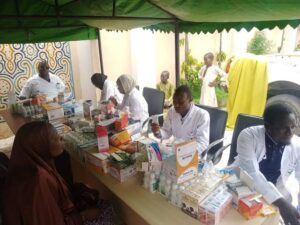


WHO targets immunisation of one million people, as Nigeria becomes first country to receive new meningitis vaccine
The World Health Organization (WHO) is targeting the immunisation of 1millikn persons as Nigeria becomes the first country in the world to roll out a new vaccine (Men5CV).
In a statement on Friday, WHO said that the vaccine would protect people against five strains of Meningococcus bacteria and described Nigeria’s feat as historic.
It said that health workers would begin an immunisation campaign aimed at reaching one million people.
The statement said that the vaccine and emergency vaccination activities are funded by Gavi, the Vaccine Alliance, which funds the global meningitis vaccine stockpile and supports lower-income countries with routine vaccination against meningitis.
According to the WHO, Nigeria is one of the 26 meningitis hyper-endemic countries in Africa, situated in the area known as the African Meningitis Belt.
It noted that in 2023, there was a 50 percent jump in annual meningitis cases reported across Africa.
“In Nigeria, an outbreak of Neisseria meningitidis (meningococcus) serogroup C outbreak, led to 1,742 suspected meningitis cases, including 101 confirmed cases and 153 deaths in seven of the 36 Nigerian states between October 2023 and March 2024.”
The states are Adamawa, Bauchi, Gombe, Jigawa, Katsina, Yobe, and Zamfara.
“To quell the deadly outbreak, a vaccination campaign was undertaken on March 25–28, 2024, to initially reach more than one million people aged 1-29 years,” it said.
The statement noted that meningitis is a serious infection that leads to the inflammation of the membranes (meninges) that surround and protect the brain and spinal cord.
“There are multiple causes of meningitis, including viral, bacterial, fungal, and parasitic pathogens.”
“Symptoms often include headache, fever, and stiff neck. Bacterial meningitis is the most serious and can also result in septicaemia (blood poisoning). It can seriously disable or kill within 24 hours,” the statement added.
It quoted WHO Director-General, Dr Tedros Ghebreyesus, as saying that meningitis was an old and deadly foe, adding that the new vaccine holds the potential to change the trajectory of the disease, preventing future outbreaks and saving many lives.
“Nigeria’s rollout brings us one step closer to our goal of eliminating meningitis by 2030,” Ghebreyesus said.
He said that the revolutionary new vaccine offers a powerful shield against the five major strains of the meningococcal bacteria – A, C, W, Y, and X – in a single shot.
All five strains cause meningitis and blood poisoning.
According to him, this provides broader protection than the current vaccine used in much of Africa, which is only effective against the A strain.
He said that the new vaccine has the potential to significantly reduce meningitis cases and advance progress in defeating meningitis.
“This is especially important for countries like Nigeria, where multiple serogroups are prevalent.
“The new vaccine uses the same technology as the meningitis A conjugate vaccine (MenAfriVac®), which wiped out meningococcal A epidemics in Nigeria,” the WHO boss said.
The statement quoted Prof. Muhammad Pate, Nigeria’s Minister of Health and Social Welfare, as saying that Northern Nigeria, particularly the states of Jigawa, Bauchi, and Yobe, were badly hit by the deadly outbreak of meningitis.
“This vaccine provides health workers with a new tool to both stop this outbreak and also put the country on a path to elimination,” Pate said.
According to him, Nigeria has done a lot of work preparing health workers and the health system for the rollout of the new vaccine.
“We got invaluable support from our populations in spite of the fasting period, and from our community leaders, especially the Emir of Gumel in Jigawa, who personally launched the vaccination campaign in the state.
“We’ll be monitoring progress closely and hopefully expand the immunisation in the coming months and years to accelerate progress,” he said.
The Minister said that the new multivalent conjugate vaccine took 13 years of effort and was based on a partnership between PATH and the Serum Institute of India.
“Financing from the UK government’s Foreign, Commonwealth, and Development Office was critical to its development,” he said.
Pate said that in July 2023, WHO prequalified the new Men5CV vaccine (which has brand name MenFive®), and in October 2023, it issued an official recommendation to countries to introduce the new vaccine.
According to him, Gavi allocated resources for the Men5CV rollout in December 2023, which are currently available for outbreak response through the emergency stockpile managed by the International Coordinating Group (ICG) on vaccine provision.
He added that the rollout, through mass preventive campaigns, was expected to start in 2025 across countries of the Meningitis Belt.
UK Minister for Development and Africa, Mr Andrew Mitchell, was also quoted as saying that the rollout of one million vaccines in northern Nigeria would help save lives, prevent long-term illness, and boost the goal of defeating meningitis globally by 2030.
“This is exactly the kind of scientific innovation supported by the UK, which I hope is replicated in years to come, to help us drive further breakthroughs, including wiping out other diseases,” Mitchell said.
He said that WHO has been supporting the Nigeria Centre for Disease Control and Prevention (NCDC) in responding to the meningitis outbreak in the country.
According to him, the areas of support include disease surveillance, active case finding, sample testing, and case management.
“WHO and partners have also played a vital role in supporting Nigeria to prepare for the rollout of the new vaccine and training health workers,” he said.
PATH’s Chief of Africa Region, Dr Nanthalile Mugala, was also quoted as saying that meningococcal meningitis had tormented countries across Africa year after year.
“The introduction of MenFive® in Nigeria heralds a transformative era in the fight against meningococcal meningitis in Africa.
“Building on the legacy of previous vaccination efforts, this milestone reflects over a decade of unwavering, innovative partnerships.
“The promise of MenFive® lies not just in its immediate impact but in the countless lives it stands to protect in the years to come, moving us closer to a future free from the threat of this disease,” Mugala said.
According to her, in 2019, WHO and partners launched the global roadmap to defeating meningitis by 2030.
“The roadmap sets a comprehensive vision towards a world free of meningitis and has three goals, including the elimination of bacterial meningitis epidemics.
Another goal is the reduction of cases of vaccine-preventable bacterial meningitis by 50 percent and deaths by 70 percent, as well as the reduction of disability and improvement of quality of life after meningitis, due to any cause.
Chief Programme Officer at Gavi, the Vaccine Alliance, Ms Aurélia Nguyen, was also quoted as saying that with outbreaks of infectious diseases on the rise worldwide, new innovations such as MenFive® were critical in helping the fight back.
She said that Vaccine Alliance funds the global stockpile as well as vaccine rollout in lower-income countries.
“This first shipment signals the start of Gavi support for a multivalent meningococcal conjugate vaccine (MMCV) programme which, with the required donor funding for our next five years of work, will see pentavalent meningococcal conjugate vaccines rolled out in high-risk countries.
“Thanks to vaccines, we have eliminated large and disruptive outbreaks of meningitis A in Africa, and now we have a tool to respond to other serogroups that still cause large outbreaks, resulting in long-term disability and deaths,” Nguyen said.
According to her, following Nigeria’s meningitis vaccine campaign, a major milestone on the road to defeat meningitis is the international summit on meningitis taking place in Paris in April 2024, where leaders will celebrate progress, identify challenges and assess next steps.
“It is also an opportunity for country leaders and key partners to commit, politically and financially, to accelerate progress towards eliminating meningitis as a public health problem by 2030,” she said.



